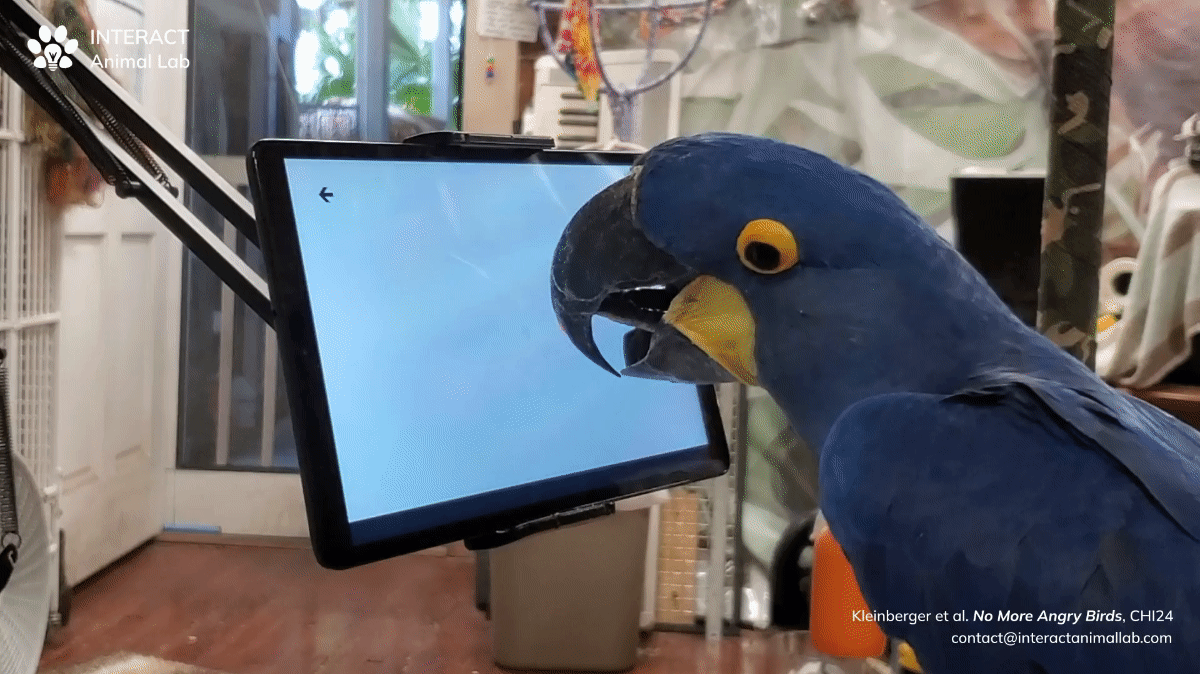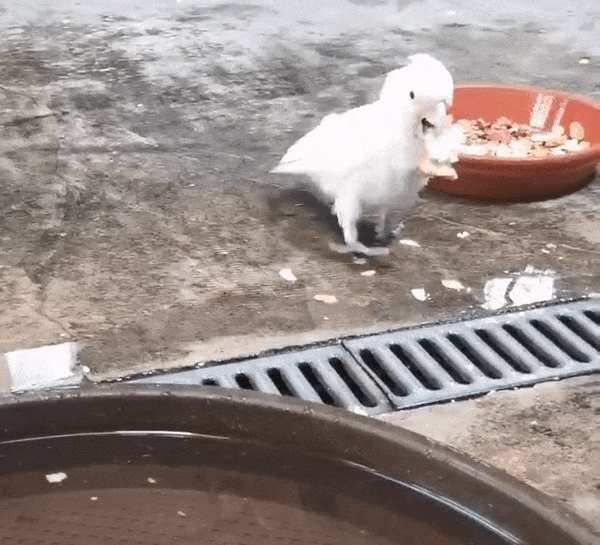Cognition
These Tiny Fish Will Assess Themselves in a Mirror Before Taking on a Foe
New findings suggest bluestreak cleaner wrasse understand how their body size stacks up against a rival
The Smell of Human Stress Leads Dogs to Make More Pessimistic Decisions, Study Suggests
Canines that smelled the sweat of anxious people were less likely to approach a bowl that might have contained food, indicating humans' emotions can affect dogs' behavior
African Elephants May Call Each Other by Name
In a new study, a computer model was able to identify the recipient of an elephant's call more than a quarter of the time, which scientists say is significantly greater than chance
Crows Can 'Count' Up to Four Like Human Toddlers, Study Suggests
Three carrion crows engaged in a simplified version of counting when prompted, and the birds showed signs of planning out their responses
Scientists Imaged and Mapped a Tiny Piece of Human Brain. Here's What They Found
With the help of an artificial intelligence algorithm, the researchers produced 1.4 million gigabytes of data from a cubic millimeter of brain tissue
Are Days Passing Too Quickly? Memorable Experiences Might Help Dilate Your Sense of Time, Research Suggests
How we process time is linked to things we see, according to a new study, which found memorable, non-cluttered imagery can make moments seem to last longer
Researchers Breed Mice With Hybrid Brains Containing Cells From Rats
In one experiment, rat neurons helped mice restore their senses of smell—the first time any animal has perceived the world through the sensory hardware of another species
How Intelligent Was T. Rex? Scientists Suggest the Dinosaurs Were Like 'Smart, Giant Crocodiles'
A new paper refutes the idea that T. rex was as brainy as a baboon, furthering the debate on the extinct reptile's intellect
Bad Sleep Can Make You Feel Years Older Than You Really Are, Study Suggests
After just two nights of short sleep, a person’s “subjective age,” or how old they feel, can spike by more than four years
Can Snakes Recognize Themselves? One Species Has Passed a Modified 'Mirror Test' Based on Smell
Eastern garter snakes might recognize their own scents, suggesting the reptiles are more cognitively complex than thought, according to a new study
Black-Capped Chickadees Are Masters of Memory—and Scientists Are Finding Out Why
The small birds use brain “barcodes” to remember where they stash food, according to new research
Watch Pet Parrots Learn to Play Tablet Games—With Their Tongues
Scientists are studying how the intelligent, social birds interact with touchscreens to help design mobile apps that serve as enrichment for the birds
Dogs Can Understand the Words for Several Objects, Such as Toys and Leashes, Study Finds
Your dog may know the word "ball" is associated with their favorite round squishy toy, according to new research that measured brain waves
This Extremely Rare Neurological Condition Makes Faces Appear Distorted or 'Like a Demon'
For the first time, scientists have recreated what one patient suffering from prosopometamorphopsia, or PMO, sees when he looks at faces
Ten Wild Facts About Octopuses: They Have Three Hearts, Big Brains and Blue Blood
These bizarre creatures have been around for hundreds of millions of years, and for humans, they’ve inspired horror, admiration and culinary prestige
Asian Elephants Bury Their Dead, New Research Suggests
In India, five dead calves were found buried on their backs in irrigation ditches, with evidence that multiple herd members had participated in the burials
A.I. Learns Words From a Human Baby's Perspective, Using Headcam Footage
With only limited training, the model could correctly identify certain objects, suggesting some elements of learning language are not innate to humans
These Parrots Won't Stop Swearing. Will They Learn to Behave—or Corrupt the Entire Flock?
A British zoo hopes the good manners of a larger group will rub off on the eight misbehaving birds
Sniffing Women's Tears May Reduce Aggression in Men, Study Finds
The findings, which may extend to all humans, suggest emotional tears might serve an evolutionary purpose
Watch Cockatoos Dip Their Food in Water to Make It Soggy
A new study marks the first time that dunking behavior has been documented in parrots
Page 1 of 3
:focal(750x500:751x501)/https://tf-cmsv2-smithsonianmag-media.s3.amazonaws.com/filer_public/70/99/709968db-0b2b-4d0c-8490-ddbf9e3d09e3/press_240911_kobayashi.jpg)
:focal(1060x712:1061x713)/https://tf-cmsv2-smithsonianmag-media.s3.amazonaws.com/filer_public/d4/37/d43735f1-067f-4070-b186-7cc2999185b0/gettyimages-1463449494.jpg)
:focal(3120x2080:3121x2081)/https://tf-cmsv2-smithsonianmag-media.s3.amazonaws.com/filer_public/ea/39/ea3944b5-3e26-4805-af99-aedd08875f3e/gettyimages-2151311245.jpg)
:focal(1685x1171:1686x1172)/https://tf-cmsv2-smithsonianmag-media.s3.amazonaws.com/filer_public/11/22/11228101-b1b2-4366-b675-f7f8d566f262/51984109685_632ca93abb_o.jpg)
:focal(1664x1093:1665x1094)/https://tf-cmsv2-smithsonianmag-media.s3.amazonaws.com/filer_public/c7/ba/c7baacef-cb16-4351-bd03-27bd56c1b461/connectomics2024-1-excitatoryneuronsoriginal.png)
:focal(1500x943:1501x944)/https://tf-cmsv2-smithsonianmag-media.s3.amazonaws.com/filer_public/d8/73/d873f475-0061-4cf6-a677-a74c62e328e3/50368695116_85e24b80b8_o.jpg)
:focal(2808x1872:2809x1873)/https://tf-cmsv2-smithsonianmag-media.s3.amazonaws.com/filer_public/3f/9a/3f9a09b9-6c57-4354-827f-6f45f25bb0dd/gettyimages-1234160574.jpg)
:focal(1024x683:1025x684)/https://tf-cmsv2-smithsonianmag-media.s3.amazonaws.com/filer_public/54/b1/54b11c8a-cce4-43fd-83b9-41ce0bd64ec8/juvenile_t_rex_at_carnegie_museum_of_natural_history_2013-12-14.jpg)
:focal(1060x706:1061x707)/https://tf-cmsv2-smithsonianmag-media.s3.amazonaws.com/filer_public/ab/86/ab86b9fe-90cf-4e15-b6ae-cc6b10ddd883/gettyimages-1464159268.jpg)
:focal(2464x1643:2465x1644)/https://tf-cmsv2-smithsonianmag-media.s3.amazonaws.com/filer_public/01/0e/010e2cc0-378a-456d-b0c3-e4877d6711ea/34504123290_c8b748a10f_o.jpg)
:focal(1421x947:1422x948)/https://tf-cmsv2-smithsonianmag-media.s3.amazonaws.com/filer_public/f9/67/f967137d-8dcd-44f1-8bd0-0407051901e8/pexels-aaron-j-hill-14588460.jpg)

:focal(640x427:641x428)/https://tf-cmsv2-smithsonianmag-media.s3.amazonaws.com/filer_public/71/c3/71c3994d-e0f1-47b8-a6e7-1e5593d05a4a/boxer-4214890_1280.jpg)
:focal(1874x1223:1875x1224)/https://tf-cmsv2-smithsonianmag-media.s3.amazonaws.com/filer_public/47/a7/47a7f676-2933-45ee-88d1-ab0b94114c2f/all_faces.jpg)
:focal(2007x1395:2008x1396)/https://tf-cmsv2-smithsonianmag-media.s3.amazonaws.com/filer_public/e8/88/e888c42a-fd8e-4146-ab56-f6b04cbf509a/octopus_tentacles.jpg)
:focal(640x482:641x483)/https://tf-cmsv2-smithsonianmag-media.s3.amazonaws.com/filer_public/16/08/16084453-c818-4c07-90da-c962fbbb4887/image4_2.jpeg)
:focal(1060x717:1061x718)/https://tf-cmsv2-smithsonianmag-media.s3.amazonaws.com/filer_public/0f/c4/0fc474d4-8a16-4d8e-9ac4-249e1742adf0/gettyimages-75939376.jpg)
:focal(1023x682:1024x683)/https://tf-cmsv2-smithsonianmag-media.s3.amazonaws.com/filer_public/f9/fe/f9fe6b38-2c96-47c9-b04e-90e64289d545/50169287831_0e5d30481d_k.jpg)
:focal(1061x707:1062x708)/https://tf-cmsv2-smithsonianmag-media.s3.amazonaws.com/filer_public/cf/2f/cf2f815d-db5b-4d96-a6af-8e5e5e329700/gettyimages-146601656.jpg)
